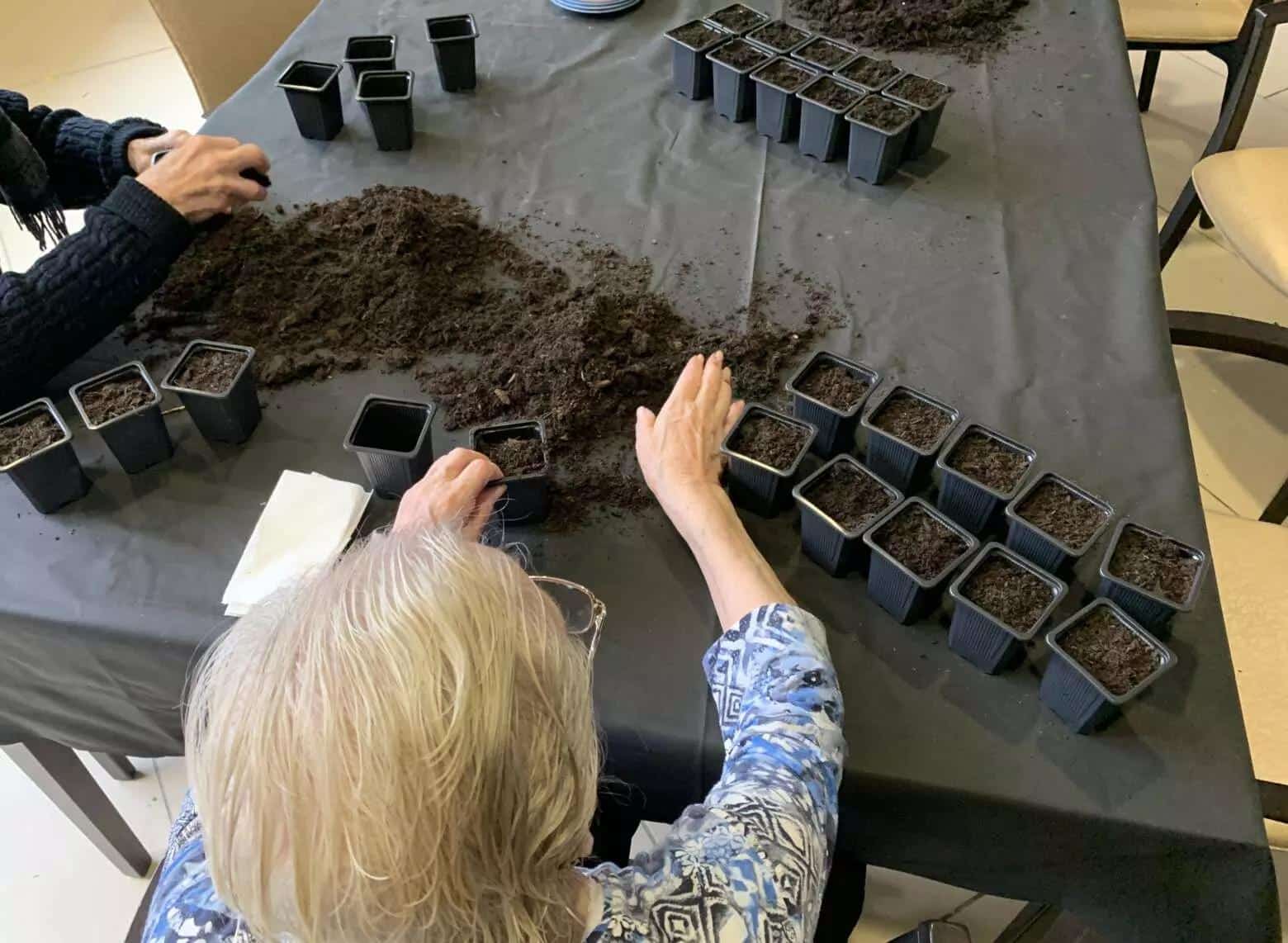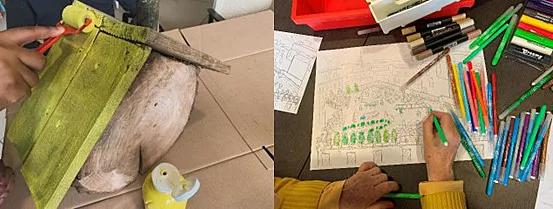How a rooftop food garden is helping people with Alzheimer’s

Curious to learn more about Gardens4Good? Listen to our podcast episode with Christophe Gadenne and Marianne Lemberger, Programme Manager at EIT Food.
In the heart of Paris, a unique initiative is growing on the rooftop of the Annie Girardot nursing home. Gardens4Good, or Planète Potager as it’s known in French, is not just a garden but a transformative project supported by the EIT Community New European Bauhaus (NEB) – led by Climate KIC – that aims to promote non-profit food gardens for a healthier life and planet. The garden is the brainchild of Christophe Gadenne, a former police officer turned urban farmer who, following a period of retraining, decided to combine his soft spot for working with older people with his dream of building a greener, cleaner Paris.
The perfect partnership
The Annie Girardot nursing home was the dream location for Christophe’s food garden with its large, accessible rooftop, and plenty of residents to engage with the project. Still in its early stages, the garden has benefitted from participation in the EIT Community NEB’s Connect NEB programme, and now aims to increase its impact beyond this first pilot in Paris.
“I’m so excited to see where the EIT Community NEB’s support can take us. My goal is to inspire others to take up similar projects in their local areas – and with the EIT Community NEB’s knowledge, create a strategy to have as widespread an impact as possible,” Christophe explains.
His vision reflects the driving force behind Gardens4Good – beyond simply the growing of vegetables and towards the cultivation of community. Christophe aims to inspire a broader movement and lifestyle changes in the bustling metropolitan city. Picture independent community gardens sprouting across Paris, encouraging citizens to embrace sustainable, cost-effective projects that connect them with nature and each other. It’s the perfect example of a project embodying the New European Bauhaus values of sustainability, beauty, and togetherness.
This is important to Christophe, who explains: “we are hoping to inspire people to do the same in their own communities, starting vegetable gardens everywhere! We don’t need a pyramid structure; we want to inspire a decentralised drive of similar own-initiative community gardens. It’s also more cost effective!”
Immediate impact, continuous gratification
The primary idea was to create a lively square that thrived regardless of the weather, and even at this early stage, the garden has had a significant impact on the lives of the residents. The space not only adds vibrancy to the nursing home but also offers therapeutic benefits – for example, nurses have noted improved morale in some residents battling depression.
Christophe notes that: “some elderly residents can’t even talk anymore – but they can easily communicate with their eyes. It’s still possible to connect with them by exchanging looks. It makes them visibly happy to be actively involved in planting and watering – especially when it’s sunny. In the spring, I hope they go out in the garden regularly to see the budding leaves, flowers, then the fruits – which they will eventually be able to eat.”
The staff at Annie Girardot also believe that an increased involvement in the growing process will lower the residents’ instincts to crave sugary, processed food, as well as leading to less food waste thanks to a change in consumption habits.

Residents and volunteers preparing seedling pots for planting.
“When the residents eat, they are more motivated to eat healthily, having become familiar with the food they helped grow. Activity coordinators have noticed that residents sometimes forget mealtimes. It’s a challenge getting them to eat and drink regularly, and the vegetable garden is a continuous reminder for them,” Christophe explains further.
The garden has quickly developed into a source of joy, and now even when it rains, residents take comfort in the natural watering of the garden. It gives them something concrete to look forward to – as the changing seasons of the garden provide a sense of structure to their lives. The garden’s overall positive impact is so tangible that a volunteer art teacher has asked to host upcoming classes in the middle of the garden to boost residents’ creativity – “a perfect illustration of NEB values,” notes Christophe.
Marianne Lemberger, Programme Manager at EIT Food, echoed this sentiment: “this is exactly the sort of own-initiative project we want to empower citizens to take up! If you have an idea that improves and beautifies local communities and has a positive environmental impact, our range of programmes could provide the training and tools you need to bring it to life.”
Growing pains
The journey has not been without its challenges, and any support is welcome. To keep costs low Gardens4Good relies on upcycling materials, handcrafting planters from locally sourced items, and avoiding car transport to reduce carbon emissions.
Christophe explains how painstaking such a process can be: “whenever you use collected materials instead of buying them online, it takes less paperwork but significantly more time. We chose to make our own soil from fallen leaves in the city and the residence’s kitchen scraps – it was a huge time commitment, slowing our momentum and draining energies.”

Residents build homes for friendly pollinators (left) and take part in nature-inspired art classes (right).
Time management has emerged as a significant challenge, with the team juggling the meticulous process of upcycling, soil creation, and planting to keep up with rapid seasonal changes. A few strategic choices have helped the project overcome tight time constraints. Perennials make up 50% of the produce grown in the garden – meaning they only need to be planted once to keep producing fruit. A limited range of fruit and vegetables cuts down on maintenance and workload. Where nursing home activities usually require extensive preparation, the contained concept of the garden leaves room for spontaneity with the support of a firm structure that saves time and money.
Christophe is particularly proud of this: “this is the recipe for a low-cost garden, financially and in terms of time spent, that can be easily replicated for different communities. Get rid of barriers to entry by simplifying the concept!”
Gardens4Good is not just a garden; it’s a living tapestry interwoven with the stories of the elderly residents and their carers, the vision of its founder, and the support of the EIT Community NEB. As it continues to grow, the garden shows that simple, community-driven initiatives can have a significant impact on the lives of individuals, their environment, and the planet.
This article is part of Climate KIC’s #FoodFutures Campaign, which showcases how we are supporting key players across the food sector in transitioning to sustainable practices. Through this campaign, we capture real-world stories and lessons from our demonstration projects across Europe, including in Ireland, to illustrate what systemic change looks like on the ground. Our goal is to highlight the transformative potential when farmers, policymakers, and industries collaborate to address the food system crisis. By connecting the dots between sustainable farming models, bridging urban-rural divides, and supporting agritech innovators, we aim to accelerate the shift toward a healthier, more resilient food system for all.
This is an edited version of an article originally published by EIT Food, as part of the Shaping Tomorrow series. All photos © Gardens4Good/Christophe Gadenne.
